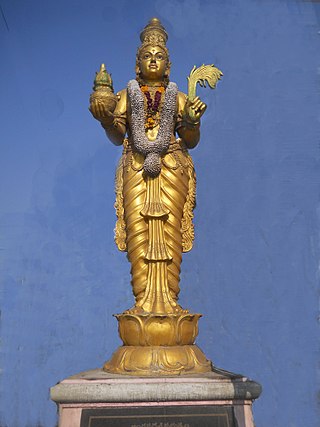Outsourcing is a business practice in which companies use external providers to carry out business processes that would otherwise be handled internally, Outsourcing sometimes involves transferring employees and assets from one firm to another.

Tata Consultancy Services (TCS) is an Indian multinational technology company specializing in information technology services and consulting. Headquartered in Mumbai, it is a part of the Tata Group and operates in 150 locations across 46 countries. It is the second-largest Indian company by market capitalization.

Foreign workers or guest workers are people who work in a country other than one of which they are a citizen. Some foreign workers use a guest worker program in a country with more preferred job prospects than in their home country. Guest workers are often either sent or invited to work outside their home country or have acquired a job before leaving their home country, whereas migrant workers often leave their home country without a specific job in prospect.
The H-1B is a visa in the United States under the Immigration and Nationality Act, section 101(a)(15)(H), that allows U.S. employers to employ foreign workers in specialty occupations. It is the largest visa category in the United States in terms of guest worker numbers. A specialty occupation requires the application of specialized knowledge and a bachelor's degree or the equivalent of work experience. The duration of stay is three years, extendable to six years, after which the visa holder can reapply. Laws limit the number of H-1B visas that are issued each year. There exist congressionally mandated caps limiting the number of H-1B visas that can be issued each fiscal year, which is 65,000 visas, and an additional 20,000 set aside for those graduating with master’s degrees or higher from a U.S. college or university. An employer must sponsor individuals for the visa. USCIS estimates there are 583,420 foreign nationals on H-1B visas as of September 30, 2019. The number of issued H-1B visas have quadrupled since the first year these visas were issued in 1991. There were 206,002 initial and continuing H-1B visas issued in 2022.
Offshoring is the relocation of a business process from one country to another—typically an operational process, such as manufacturing, or supporting processes, such as accounting. Usually this refers to a company business, although state governments may also employ offshoring. More recently, technical and administrative services have been offshored.
Cognizant Technology Solutions Corporation is an American multinational information technology services and consulting company. It is headquartered in Teaneck, New Jersey, U.S. Cognizant is part of the NASDAQ-100 and trades under CTSH. It was founded in Chennai, India, as an in-house technology unit of Dun & Bradstreet in 1994, and started serving external clients in 1996. After a series of corporate reorganizations, there was an initial public offering in 1998. Ravi Kumar S has been the CEO of the company since January 2023, replacing Brian Humphries.
An L-1 visa is a visa document used to enter the United States for the purpose of work in L-1 status. It is a non-immigrant visa, and is valid for a relatively short amount of time, from three months to five years, based on a reciprocity schedule. With extensions, the maximum stay is seven years.

Pentalog is a privately owned business founded in 1993 by Frederic Lasnier in Orléans, France and now headquartered at Château des Hauts in La Chapelle-Saint-Mesmin. The company expanded over the years to offices and delivery centers in Paris, North America, Romania, Republic of Moldova (Chisinau), Mexico (Guadalajara), Germany (Frankfurt), Vietnam (Hanoi), Switzerland (Geneva) and Singapore.

One of the most dynamic and fastest growing sectors in the Philippines is the information technology–business process outsourcing (IT-BPO) industry. The industry is composed of eight sub-sectors, namely, knowledge process outsourcing and back offices, animation, call centers, software development, game development, engineering design, and medical transcription. The IT-BPO industry plays a major role in the country's growth and development.
Business process outsourcing to India refers to the business process outsourcing services in the outsourcing industry in India, catering mainly to Western operations of multinational corporations (MNCs).
On-demand outsourcing is a trend in outsourcing wherein major internal operations processes of a company are being shifted to a provider that is paid for by the number of transactions involved. The business transferring the services pays for the quality, special skills and the competence of the service provider's employees. There has been an expansion of the outsourcing concept to include on-demand outsourcing. This refers to the process undertaken by business managers to adopt an outsourcing policy that ensures that the specific business and supplies including technical manpower are accessed as the need arises. It focuses a business strategy to improve its goods and services and to drive a business towards quality improvement.
In software engineering, offshore custom software development consists in offshoring the software development process in a country where production costs are lower, thus decreasing budget spending.
Gambling in India varies by state; states in India are entitled to formulate their own laws for gambling activities. Some states like Goa have legalised casinos. Common gambling activities like organized betting are restricted except for selective categories including lottery and horse racing.

The Telugu Diaspora refers to Telugu people who live outside their homeland of Indian states of Andhra Pradesh and Telangana. They are predominantly found in North America, Europe, Australia, Caribbean, Gulf, Africa and other regions around the world. There are also few Telugus from other Indian states such as Karnataka, Tamil Nadu, Odisha and Maharashtra, who live outside India. Telugus of Andhra Pradesh origin, living outside India are often referred as Non-resident Andhras (NRA). After the bifurcation of the United Andhra Pradesh, these are popularly referred as Non-resident Telugus.
The American Competitiveness in the 21st Century Act (AC21) was an act passed by the government of the United States in October 2000, pertaining to immigration to the United States. It was a complement to the American Competitiveness and Workforce Improvement Act that had been passed in 1998. The focus of AC21 was to change rules related to portability and caps for the H-1B visa to increase the effective number of visas available and make it easier for workers on those visas to switch jobs. Although the language of the Act references the Immigration and Naturalization Service (INS), the INS would soon be restructured and the functions of the INS referenced in AC21 would be handled by United States Citizenship and Immigration Services.
The American Competitiveness and Workforce Improvement Act (ACWIA) was an act passed by the government of the United States on October 21, 1998, pertaining to high-skilled immigration to the United States, particularly immigration through the H-1B visa, and helping improving the capabilities of the domestic workforce in the United States to reduce the need for foreign labor.

Sold Out: How High-Tech Billionaires & Bipartisan Beltway Crapweasels Are Screwing America's Best & Brightest Workers is a 2015 book authored by Michelle Malkin and John Miano, a displaced high-tech professional, author and attorney who specializes in business immigration law at the policy level.
The term H-1B-dependent employer is used by the United States Department of Labor to describe an employer who meets a particular threshold in terms of the fraction of the workforce comprising workers in H-1B status. An employer classified as H-1B-dependent needs to include additional attestations in the Labor Condition Application used for the petition of any H-1B beneficiary being offered an annual compensation of less than $60,000 and without a master's degree. The notion was introduced by the American Competitiveness and Workforce Improvement Act (ACWIA) passed in 1998 and operationalized through the United States Department of Labor's Interim Final H-1B Rule of December 20, 2000. The regulation is found in 20 CFR 655.736 in the Code of Federal Regulations.
Relaunched under the umbrella organization United Information Workers

Dabhadkar Rajiv is an Indian technocrat, author, columnist and CEO & Founder of "National Organization for Software and Technology Professionals".






